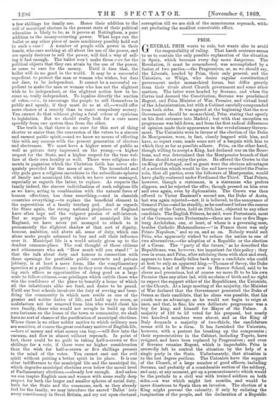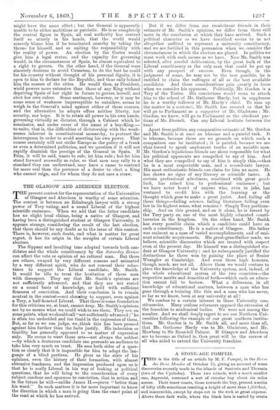PRIM.
GENERAL PRIM wants to rule, but wants also to avoid the responsibility of ruling. That harsh sentence seems to us to contain the only possible explanation of the situation in Spain, which becomes every day more dangerous. The Revolution, it must be remembered, was accomplished by a fusion of two parties,—the Progressives, or, as we should say, the Liberals, headed by Prim, their only general, and the Unionists, or Whigs, who desire regular constitutional government under monarchical forms, but differ greatly from their rivals about Church government and some other matters. The latter were headed by Serrano, and when the Cortes had decreed the Constitution, Serrano was proclaimed Regent, and Prim Minister of War, Premier, and virtual head of the Administration, but with a Cabinet carefully compounded from both sides. It was agreed at the beginning that the new Government should be monarchical, Prim stating that openly on his first entrance into Madrid ; but with that exception no programme was laid down, and from the first radical differences of opinion made their appearance in the revolutionary Govern- ment. The Unionists were in favour of the election of the Duke de Montpensier, were, in fact, closely leagued with him, and have, as report runs, made some sort of a bargain with him to which they as far as possible adhere. Prim, on the other hand, though willing to accept a King, had declared war on the Bour- bons, and was determined that the Montpensier branch of that House should not enjoy the prize. He offered the Crown to the ex-King of Portugal, and so great were the obvious advantages of a selection which would in the end have re-united the Penin- sula, that all parties, even the followers of Montpensier, would have gladly coalesced under Ferdinand the Third. That Prince, however, though a statesman, is a statesman who prefers slippers, and he rejected the offer, though pressed on him over and over again, even by diplomatists. The Crown was then offered to Victor Emanuel's second son, the Duke of Aorta, but was again rejected—not, it is believed, to the annoyance of General Prim—and he steadily, as he confessed before the caucus meeting of the Cortes, held on 29tkinst., objected to any other candidate. The English Princes, he said, were Protestants, most of the Germans were Protestants—there are four or five Haps- burg Archdukes, one, at least, of whom is a governing man, besides Catholic Hohenzollerns—" in France there was only Prince Napoleon," and so on, and so on. Nobody would snit Prim, who apparently wished 'to reduce the nation to one of two alternatives,—the adoption of a Republic or the election of a Cassar. The "party of the future," as he described the Republicans, was, however, too impatient for this policy ; they rose in arms, and Prim, after subduing them with shot and steel, appears to have finally fallen back upon a candidate who could at best be only an apparent king,—Thomas of Savoy, the Duke of Genoa, a lad of fifteen now in Harrow School, said to be clever and precocious, but of course no more fit to be his own Premier than any other lad, with no claim of birth and no right to expect the support either of the Republicans, the Unionists, or the Church. At a large meeting of the majority, the Minister of War declared that the Government presented the Duke of Genoa as their candidate, that he alone was possible, that his youth was an advantage, as he would not begin to reign at once, and that, in fine, his own deliberate programme was a boy for king, and himself for Mayor of the Palace. A majority of 126 to 52 voted for his proposal, but nearly two hundred members were absent, and as the King of Italy demands a majority of two-thirds, the candidature seems still to be a form. It has furnished the Unionists, however, with a pretext for breaking up the compromise ; their representatives in the Cabinet, including Topete, have resigned, and have been replaced by Progressives ; and even if Serrano remains Regent, which is improbable, Prim is avowedly left to control the situation by the help of a single party in the State. Unfortunately, that situation is to the last degree perilous. The Unionists have the support
of the Church, of a large number of good officers, including Serrano, and probably of a considerable section of the soldiery,
and may, at any moment, get up a pronunciamento which would be the prelude to a civil war with trained soldiers on both sides,—a war which might last months, and would be more disastrous to Spain than an invasion. The election of a King might prevent the calamity, if only by enlisting the imagination of the people, and the declaration of a Republic
might have the same effect ; but the General is apparently unable to be either ambitious or patriotic. He is so completely the central figure in Spain, all real authority has centred itself so utterly in his hands, that the world would scarcely blame him if he terminated anarchy by taking the throne for himself, and so uniting the responsibility with the reality of power. An election by the Cortes would give him a legal status, and the capacity for governing would, in the circumstances of Spain, be almost equivalent to a right to govern. On the other hand, if the General were sincerely desirous to avoid Csarism, to do the best he could for his country without thought of his personal dignity, it is open to him to declare for the Republic, and thus rally behind him the masses of the cities. He would then, as President, wield powers more extensive than those of any King without depriving Spain of her right in future to govern herself, and elect her own rulers. Some sentiment, however, or it may be some sense of weakness imperceptible to outsiders, seems to weigh in the General's mind against either of these courses, and the alternative he adopts offers neither liberty, nor security, nor hope. It is to retain all power in his own hands, governing virtually as dictator, through a Cabinet which he nominates, and under cover of the name of a boy-King,-- to unite, that is, the difficulties of dictatorship with the weak- nesses inherent in constitutional monarchy, to protract the interregnum in order to avoid asserting his own power. That course certainly will not strike Europe as the policy of a frank or even a determined politician, and we question if it will not rapidly diminish the prestige of the General in Spain. If Prim, it will be said, wants to rule, let him rule ; but let him stand forward avowedly as ruler, so that men may rally to a standard they can understand, may have a cause to contend for more real than the pretence of a desire to elect a King who cannot reign, and for whom they do not care a straw.































 Previous page
Previous page